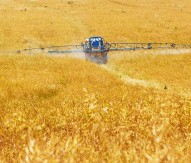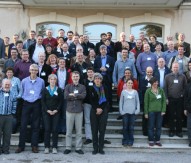
Reducing the use and risk of pesticides

Françoise Lescourret © PURE
At the Future Integrated Pest Management (IPM) Conference at Riva del Garda, Italy brought together 600 researchers and academics from 37 different countries across Europe and North America to debate how to reduce the use and risk of pesticides in Europe. Important topics also discussed include implementing the Directive 2009/128/EC (establishing a framework for community action to achieve the sustainable use of pesticides) and improving the protection for plants against pest and pathogens.
Françoise Lescourret is the co-ordinator of the FP7 PURE project (Pesticide Use and risk Reduction in European farming systems with Integrated Pest Management) and director of research at INRA, the French National Institute for Agricultural Research. The objective of the project is to develop IPM solutions to reduce the dependence on pesticides in key major farming systems in Europe. It is hoped that research on IPM will continue under Horizon 2020.
I wonder if you could start-off by giving me an overview of the PURE project?
The PURE project originates from a European network of excellence known as ENDURE that gathered researchers working on diversifying crop protection.
ENDURE was a Network of Excellence funded by the EU between 2007 and 2010 and co-ordinated by Pierre Ricci of INRA. Since 2010, ENDURE continues as a European Research Group co-ordinated by Antoine Messéan, research manager at INRA.
One important role of this network was to setup a dialogue allowing people to share their common knowledge and culture and it was, in my opinion, one of the main building blocks to create a core consortium of people and develop the PURE project.
The objectives of the network and this project are to promote IPM ideas and solutions to reduce the reliance on pesticides in European farming systems.
How have you found working with the European Commission during FP7?
We have had a good relationship with the Commission during FP7. We are particularly helped by our EU project manager who belongs to a company called INRA Transfert that assists in facilitating our relationship with the EU. We have a good structure in the European project – we have deliverables, we have meetings, we have a description of work – many things are prepared before the PURE project started and we have good guidelines. We know where we want to go, even if it is necessary to adapt our direction and change our objectives from time to time. The project began in 2011 and is now under review; it runs until 2015.
We hope to extend the research on IPM under Horizon 2020. We have a strong relationship with ENDURE, which is now a permanent European Research Group, acting as a platform for knowledge exchange regarding all aspects of IPM. The group is in charge of a strategic research agenda that should, hopefully be reflecting on the priority objectives under Horizon 2020.
What aspirations do you have for the PURE project in the near future?
We want to concretise the design of IPM solutions following our tests – we are keen to analyse the results from different countries, different conditions, different locations where experiments have been taken out. We have also just begun to reflect how to gather all the information regarding the different farming systems together. Therefore, by the end of the project, we hope that innovative IPM solutions will be implemented in practice.
Do you think Horizon 2020 has enough focus on this area of agricultural research?
I was very interested to hear the thoughts from Patrizia Pitton (DG SANCO, European Commission) and the objectives of the Commission to implement innovation partnerships. In the PURE project, we have begun a work package on the co-innovation process with researchers and stakeholders including farmers and we have high expectations about this part of the work and its results. I think that Horizon 2020 will pay special attention to this kind of research and I’m very optimistic.
In the near future, we have also to shift to a wider research-innovation system and to address the management of multiple ecosystem services – I think this is the main challenge facing Europe and the rest of the world.
Françoise Lescourret


